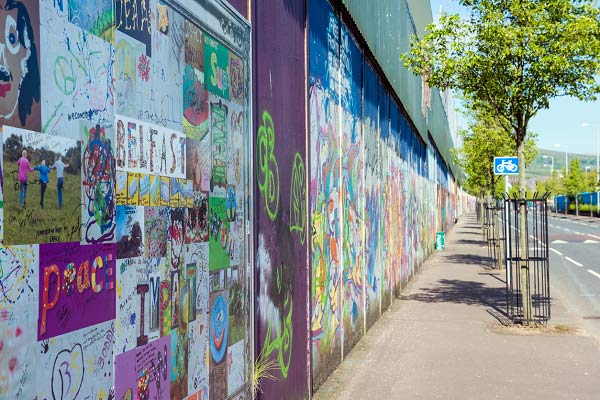Why is the Good Friday Agreement still relevant to the left in Europe today? What can we learn from this peace process and the search for compromise in changing circumstances? These and other questions will be discussed in this webinar organised by transform! europe and the Rosa-Luxemburg-Foundation.
25 years ago, the Good Friday Agreement ended the Northern Ireland conflict that had lasted for years – one of the fiercest, bloodiest conflicts between the British and Irish in the North of Ireland. While the overwhelming majority of Protestant Unionists continued to see Northern Ireland as part of Great Britain, the mostly Catholic Nationalists favoured unification with the Republic of Ireland. This conflict has cost the lives of more than 3,500 people. After the phase of escalation due to discrimination against the Catholic population by Political unionists, a difficult and repeatedly fragile peace process developed over the years, which finally came to an end in 1998 with the Good Friday Agreement between the Republic of Ireland and the United Kingdom. This agreement included in particular the willingness to disarm the paramilitary units of the (provisional) Irish Republican Army (IRA), the Ulster Defence Association (UDA) as well as the Ulster Volunteer Force (UVF), the release of underground fighters from prisons and a clarification of the fates of the disappeared and victims of the conflict, including the IRA as well as the Northern Ireland police of the British military, the secret services and loyalist paramilitaries.
In addition, the Good Friday Agreement set out a conditional, consensual way of uniting Northern Ireland and the Republic of Ireland if the majority of people on both sides agreed to this by referendum.The agreement is based on the three principles of partnership, equality and mutual respect.
However, due to Brexit, the conditions have changed fundamentally, and the agreement seems to be challenged in a new way with the new EU external borders between Northern Ireland and the Republic of Ireland. The compromise now reached on the Northern Ireland Protocol between the British government under Rishi Sunak and the European Union has been acknowledged by pro protocol parties. The question is, can it be implemented politically? How stable is it and what does a possible unification of Northern Ireland and the Republic of Ireland mean?
Thursday, 6 April 2023
18:00-19:30 (CET)
Click here to register.
Click here to view the Facebook event.
Programme
Thursday, 6 April
18:00-19:30 (CET)
Why is the Good Friday Agreement still so significant for the Left in Europe today? What can we learn from this peace process, and from the search for compromises under changing conditions? What can we learn from the experience of breaking out of the spiral of violence, of the transformation from paramilitary to political actors and of the strategy of a consensual approach with the aim of a united peaceful Ireland? Why would this also be in the interest of leftists? What role can and should the EU play in these processes?
We want to discuss all these questions with:
- Martina Anderson, former MEP, Sinn Féin Representative to Europe
- Professor Colin Harvey, Queen’s University Belfast
- Heinz Bierbaum, chair, Rosa-Luxemburg-Foundation
- Trademark Belfast (tbc)
Moderation:
- Katerina Anastasiou, transform! europe
